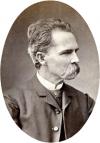Jorge Isaacs poet from Spain was born on January 4, 1837, date of death is unknown. Poems were written in Romantic age mainly in Spanish language. Dominant movement is romanticism.
Biography
Jorge Isaacs Ferrer (April 1, 1837-April 17, 1895) was a Colombian writer, politician and soldier. His only novel, María, became one of the most notable works of the Romantic movement in Spanish literature.
His father was George Henry Isaacs, an English Jew originally from Jamaica. He first settled in Chocó, Colombia, where he made a fortune from gold mining and trade with Jamaica. He then moved to Cali where he converted to Christianity, bought his Colombian citizenship from Simon Bolivar and paid for it in cows. (There is a plaque on a bridge north of Bogota to commemorate this.) He married Manuela Ferrer Scarpetta, daughter of a Spanish Navy officer. He also owned two haciendas near Cali, called "La Manuelita" (named after his wife) and "El Paraíso". The latter would provide the setting for María. "El Paraiso" has been preserved as a museum, with emphasis upon its relation to the novel.
Jorge Isaacs was born in Quibdó in 1837. Little is known about his childhood, but in some of his poems Isaacs portrays the Valley of the Cauca as an idyllic place where he spent his most of it. He was first educated in Santiago de Cali, then in Popayán and, finally, in Bogotá between 1848 and 1852.
Isaacs returned to Santiago de Cali in 1852 without finishing his baccalaureate studies. In 1854 he fought for seven months in the Cauca Campaign against the dictatorship of General José María Melo. In 1856 Isaacs married Felisa González Umaña, who was fourteen years-old at the time and they went on to have many children.
During the time of the civil wars his family went through a period of economic hardship. Isaacs tried unsuccessfully to become a merchant as his father. He then turned to literature and wrote his first poems between 1859 and 1860. During that time he also wrote several dramas of historical theme. Isaacs took arms again in 1860, this time against General Tomás Cipriano de Mosquera, and saw action in the Battle of Manizales during the Colombian Civil War (1860-1862). In 1861 Isaacs' father died; when the war ended Isaacs returned to Cali to take over the administration of his father's businesses, but he found them deeply in debt. This forced him to auction off two of his father's haciendas "La Rita" and "La Manuelita", which were bought by the industrialist Santiago Eder.
Isaacs' economic hardship took him back to Bogotá, where he found that his literary efforts were being well received. The members of the rea der's club "El Mosaico" offered to publish his poems after Isaacs read them in one of their sessions. This compilation was published under the name Poesías in 1864. That year Isaacs took a job as the supervisor of the construction of a horse-path between Buenaventura and Cali and started to write María. Around that time he also fell ill with malaria.
When María was published in 1867 it became an immediate success both in Colombia and in other Latin American countries. As a consequence Isaacs became a well-known personality in Colombia and his newly-found fame allowed him to start a career as journalist and politician. As a journalist he directed the newspaper La República, of moderate conservative tendencies, in which he also published some articles. As a politician he first joined the Conservative Party, but later switched to the Radical Party. In 1870 he was sent to Chile as consul general. On his return to Colombia he was actively involved in the politics of Valle del Cauca, which he represented in the Colombian Congress, and in 1876 he fought in yet another civil war. However his political career ended in 1879 after an incident where he proclaimed himself political and military leader of Antioquia in response to a conservative revolt.
After his retirement from politics Isaacs published in 1881 the first canto of the poem Saulo, although he was never able to complete it. He also explored the Magdalena Department, in the north of Colombia, where he found important coal and oil deposits. Isaacs spent the last years of his life in the city of Ibagué in Tolima where was planning to write a historical novel. He died of malaria on April 17, 1895. ..






